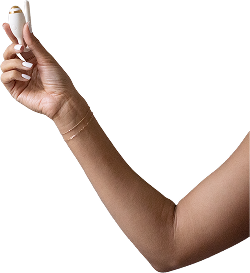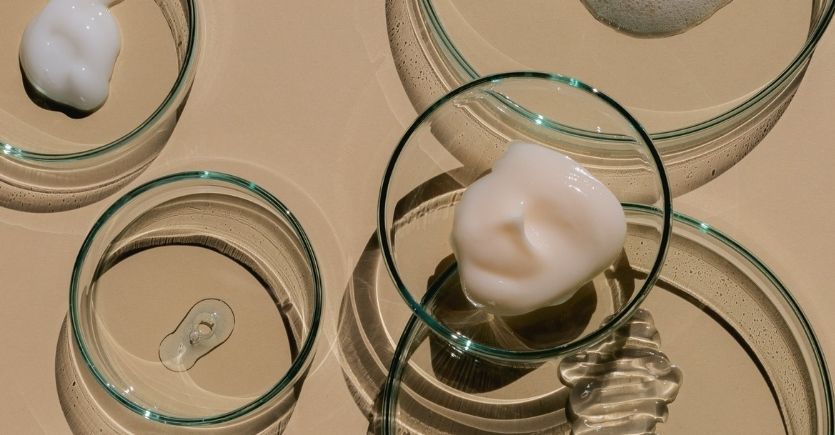In a world of cleanwashing and impossible to pronounce ingredients, we understand how difficult it can be to find products that you can safely incorporate into your daily routine. We also understand that when you’re pregnant or trying to conceive (TTC), this task has added importance. That’s why we’ve rounded up a list of some of the most commonly found ingredients we recommend avoiding during these life stages for your peace of mind.
First, let’s look at three chemicals that are best avoided at all times, even when not pregnant or TTC.
First, let’s look at three chemicals that are best avoided at all times, even when not pregnant or TTC.
Parabens
Parabens are a family of chemicals commonly used as preservatives in cosmetic products like makeup, moisturizers, shampoos, and shaving gels. You won’t typically see ‘parabens’ listed on the back of a product though; instead, you might notice common parabens like methylparaben, ethylparaben, and propylparaben. While widely found, there are some concerns that parabens are linked to issues when TTC and during pregnancy. For example, one study found that men who have been exposed to parabens have lower testosterone levels and more abnormally shaped or slower-moving sperm. For those carrying little ones, there’s also some concern around parabens’ ability to mimic estrogen and disrupt normal hormone function.
Phthalates
Phthalates are a group of chemicals that can help make plastics more durable and assist in dissolving other materials. Phthalates like DBP (dibutyl phthalate), BBzP (benzyl butyl phthalate), and DEHP (di 2-ethylhexyl phthalate) are found in countless products, including soaps, shampoos, nail polishes, and items like garden hoses and vinyl flooring. However, you won’t find phthalates in the Standard Dose curation because they’re believed to be endocrine disruptors that can affect thyroid and hormone levels in pregnant people, resulting in complications like preterm birth and maternal glucose disorders.
BPA
Bisphenol A, commonly known as BPA, is a chemical that’s used to make certain plastics and resins. You’ll find it in many water bottles and food containers but research has shown that BPA can seep into food and drinks from these. This is alarming because BPA has been linked to possible health effects on the brain and prostate glands of fetuses, infants, and children.
While the above ingredients are best avoided at all times, there are others that Team Standard Dose generally loves using but don’t recommend during certain life stages.
While the above ingredients are best avoided at all times, there are others that Team Standard Dose generally loves using but don’t recommend during certain life stages.
Retinol
Derived from vitamin A, retinol is a well-loved skincare ingredient that promotes collagen production for plump, dewy, and youthful-looking skin. However, we don’t recommend using retinol while pregnant or breastfeeding because it can be transferred from parent to baby. This is problematic because retinol is linked to physical and cognitive birth defects. Thankfully, other skincare favorites like vitamin C, hyaluronic acid, and niacinamide can serve as alternatives during this precious time, though it’s always a good idea to research where and how these ingredients are derived.
Black Cohosh
A member of the buttercup family, black cohosh can be found in many supplements and patches to treat PMS or menopause symptoms. While we love turning to black cohosh to help relieve menstrual cramps, we don’t recommend this supplement to pregnant people, particularly during the first trimester, as it has also been traditionally used to induce labor.
But what about ingredients that are recommended when pregnant or TTC? Here are a couple of our favorites:
But what about ingredients that are recommended when pregnant or TTC? Here are a couple of our favorites:
Vitex
Also called the chaste tree, vitex is a large, berry-producing shrub that has long been used as a herbal remedy for hormonal concerns. For example, luteal phase defect (a shortened second half of the menstrual cycle) is a condition that can make it difficult for people to become pregnant and is linked to abnormally high prolactin levels. Vitex can help to reduce these levels, thus supporting fertility. Vitex has also been known to improve menstrual cycle regularity, another obstacle some face when TTC.
Rosehip Oil
As its name suggests, rosehip oil is made from the ‘seeds’ of rose flowers and can be used to moisturize your tummy to help prevent the severity of stretch marks while pregnant. Other natural oils we love for stretch marks include sweet almond oil (which is packed with vitamin E to help hydrate skin and promote regeneration) and argan oil (which can help increase skin elasticity).
We hope this list serves as a starting point for the products and ingredients to avoid – or reach for – when pregnant or TTC. Of course, we recommend speaking with your healthcare provider, OB/GYN, or dermatologist about what’s best for you during your unique journey.
We hope this list serves as a starting point for the products and ingredients to avoid – or reach for – when pregnant or TTC. Of course, we recommend speaking with your healthcare provider, OB/GYN, or dermatologist about what’s best for you during your unique journey.


